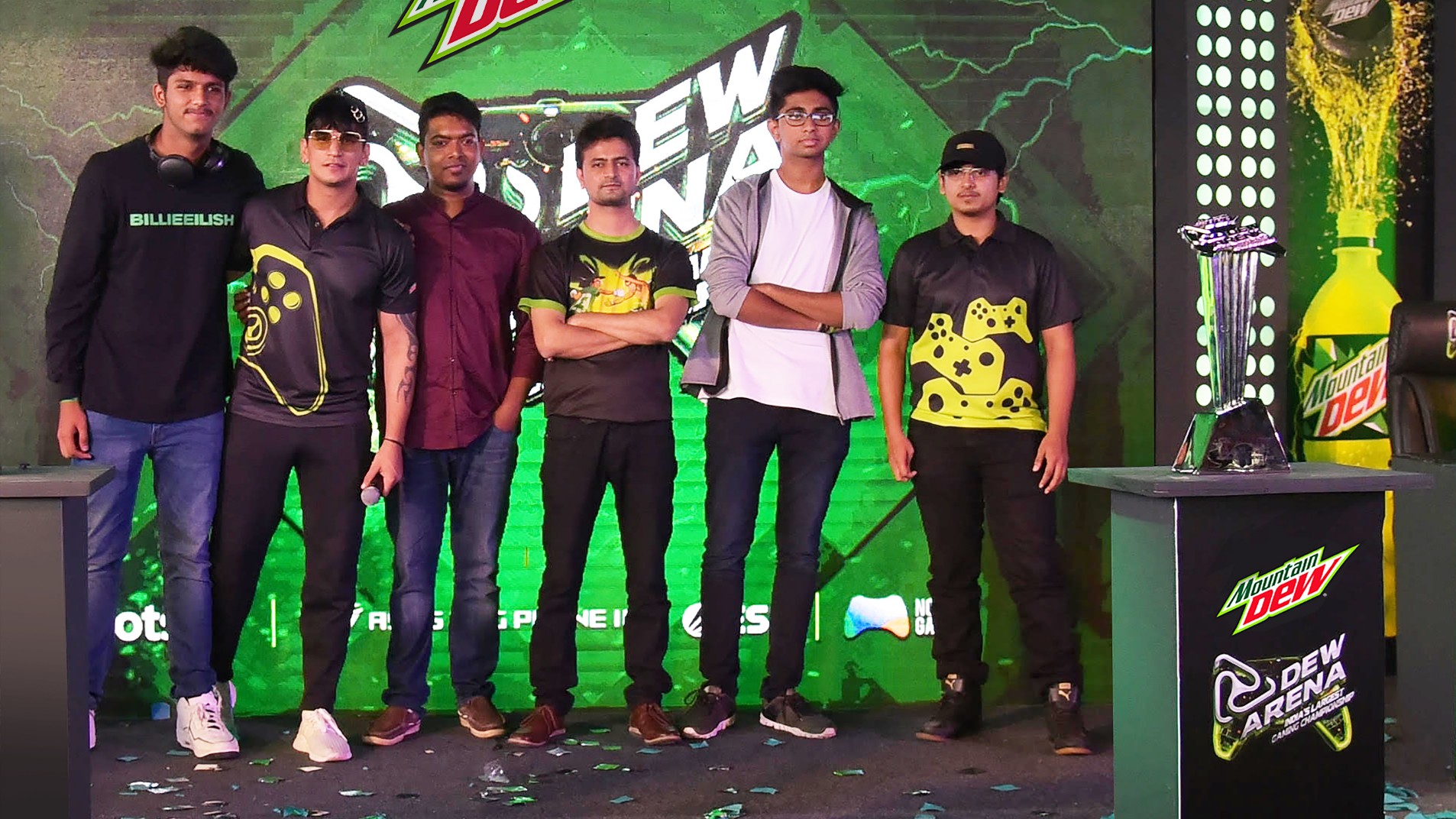Esports is no more an urban phenomenon, thanks to mobile gaming
A scoop from India's largest gaming championship

I was at the fourth edition of the Mountain Dew Arena finale earlier this month, where I could witness how esports is reaching to the roots of the country. It was the first time when the organizers had introduced mobile games to the competition, and the numbers have changed drastically.
While many still believe that PC is the epitome of esports or competitive gaming, you can't certainly ignore the lift that smartphone gaming has given to the culture.
At this point in 2019, it's evident that the Indian digital gaming industry is snowballing with big names like Tencent, Nazara, Paytm, etc. investing in it. Moreover, estimates imply that India's mobile games market will be worth $1.1 billion by 2020. It has also emerged as one of the top five countries in terms of mobile gaming user base globally. Let's not forget that India also ranks second in number of smartphone shipments after China, and that's also a huge contributor.
While that would have given you an idea of how big esports is expected to be in the coming years, the Mountain Dew Arena is a vivid example of the change that mobile gaming has brought to the industry.
Numerous factors are leading to exponential growth of competitive gaming in India. To understand a few of them better, I spoke to some of the key people working towards empowering esports culture in India through tournaments like Mountain Dew Arena.

Esports culture on a rise in India
From receiving just 70,000 registrations in 2016 to 1.5 million in 2019, Mountain Dew Arena has grown big, and so is the gaming culture in the country.
I asked Naseeb Puri, Director, Mountain Dew & Energy, PepsiCo about her view on how the gaming culture has evolved and the role these tournaments play in promoting it. She told me, "we started Dew Arena in 2016, and we started it because we found there is such a big passion around esports. It is probably the fastest growing youth trend today."
Get daily insight, inspiration and deals in your inbox
Sign up for breaking news, reviews, opinion, top tech deals, and more.
The number of participants has grown more than 20x in four years. On this, Naseeb says "the growth has been significantly big. I think what has changed is the scale, what has evolved is our confidence in the platform."
Naseeb looks at the tournament as the right platform that allows youth to showcase their talent without any restrictions. This year onwards, they introduced mobile games for both smartphone and feature phone users enabling more players to participate in the tournament. Resulting, the number of applications doubled from 7 lakh to 1.5 million over a year.
PC Gaming is test cricket while mobile gaming is T20
Akshat Rathee, MD, ESL India explained to me a very interesting example when I asked him his views about PC gaming vs mobile gaming.
He says, "consider PC as test match and mobile as twenty20 cricket. Because of the twenty20 format, cricket became fun and got massified. But if you ask professional players about what is the epitome of cricket? They will still say it's Test cricket. It's the same with PC gaming."
PC Gaming is definitely more serious and well organized on a global level but mobile gaming has spread the competitive culture to everyone's pocket. Akshat believes this has definitely helped young players like Naman Mathur (Mortal) become household celebrities, but it will not overlap the relevance of PC gaming. He says, "you will always see a space for PC at the top, where there will be some elite competitions across the world. So both will exist, and both will play a very strong value in their own way. However, if popularising in India is concerned, mobile gaming has undoubtedly played a major role."
Esports is slowly getting into the roots
Esports has majorly revolved around PC and console gaming in the past. But as seen in the last few years, it has branched out to mobile phones. Where initially it was only perceived as a hobby, some popular online multiplayer titles like Clash Royale and PUBG Mobile have introduced a new aspect of competitive gaming.
Esports and gaming is not a higher SSC book top of the pyramid job. It's a mass youth passion, and we want to serve that out there.
Naseeb Puri, MD, Mountain Dew
In order to reach the maximum number of players across the map, Mountain Dew Arena gaming truck goes across 200 odd locations, including small towns and tier two cities where Naseeb senses a huge scope. She told me that mobile gaming has the potential to unlock rurally. She says, "smartphones are clearly going to explode in this space but that being said, what I am now discovering is that even feature phones are big for gaming and as a result, our strategy as we go mass is to unlock mobile in an even bigger way if we really want to go to the heartland of the markets. When I say 1.5 million participants 80-85% participants come from mobile. So ultimately, the mass and scale are on mobile."
Naseeb further told me that they'd got a phenomenal response from tier 2 and tier 3 cities. "We have people here who are not all from Delhi and Mumbai. It's a deep rural phenomenon, formats like first-person, car racing, and similar are highly engaging not only as a player sport but also as spectator's," she said.
Akshat explained with simple logic, "as you go mobile, the platform is more mass; as a result, you see more people coming on from tier 2 and tier 3 markets. In PC competitions, most of the players are from Mumbai, Bangalore Hyderabad or Chennai. But if you look at mobile, all of these people are from smaller cities that many haven't even heard of. Warangal, Bhilai, and Tiruchirapalli, for example."
Promoting esports is a collective effort
By now you must have understood how mobile gaming has popularised esports in the country, but that's just one aspect of it. There are multiple forces working collectively in shaping the future of esports in India.
The Mountain Dew Arena, in particular, is aided by the most powerful names working towards promoting esports in India. It has collaborated with ESL and Nodwin Gaming, which are the two of the biggest esports companies in the world and in India respectively. These two are "almost tied at the hip with us for actually building this platform out," says Naseeb.
Gaming is as much a spectator sport as a player's sport. A clear proof is a rise in the number of streamers and their following on various platforms. To take care of this, Dew Arena had partnered with Hotstar in its second edition where it live streams the tournament finale.
Naseeb added that they are looking forward to building a very strong content pipeline around gaming to add more value to the tournament by building a viewership around it. Popular games with a massive user base like PUBG Mobile also help the competition reach more users and draw eyeballs towards the tournament.
Wishing for Olympic gold in esports for India
When I asked about the long term vision of Mountain Dew Arena, Naseeb told me that "sky is the limit." She explained, "we want to be able to provide a platform to players to showcase their skills and hopefully, we will one day have an Olympic gold winner for India in Esports."
Who else is a better example than Mortal who has put India on the global map when it comes to competitive gaming? Luckily, we got a chance to hear what he had to say about the event. He told us, that "I hope there are more events like Mountain Dew Arena so that more and more participants across different games can come out and prove themselves as I did."
Competitive esports tournaments like Mountain Dew Arena play a vital role in pushing the gaming culture and giving budding gamers a platform to gain recognition with their skills. It gives them an opportunity to pursue professional gaming and make a career in it.
Sudhanshu Singh have been working in tech journalism as a reporter, writer, editor, and reviewer for over 5 years. He has reviewed hundreds of products ranging across categories and have also written opinions, guides, feature articles, news, and analysis. Ditching the norm of armchair journalism in tech media, Sudhanshu dug deep into how emerging products and services affect actual users, and what marks they leave on our cultural landscape. His areas of expertise along with writing and editing include content strategy, daily operations, product and team management.
